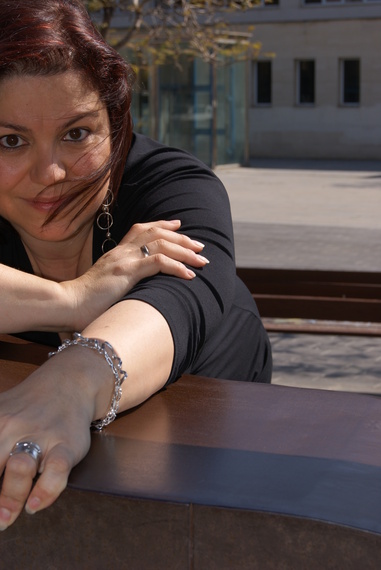Care Santos is one of Spain's most versatile and prolific writers. Writing in both Catalan and Spanish, and for both adults and young readers, she is the author of over 40 books in different genres, including novels, short story collections, young adult and children's books, etc. Her most recent adult novel, Desig de xocolata, won the 34th Ramon Llull Prize. Her work has also been translated into Basque, Galician, French, German, Greek, Hebrew, Italian, Korean, Lithuanian, Norwegian, Portuguese, Romanian, and Swedish, as well as English. She lives with her family in Mataró, Barcelona.
Santos's collection, Dissection, translated into English by Lawrence Schimel, has just been published by A Midsummer Night's Press as a part of its new Periscope imprint. Recently, I talked with Santos about her work as a poet.
Enszer: Care, will you begin by telling us a bit about your work as a writer?
Santos: It is increasingly more difficult to know what kind of writer I am. Restless, curious, dedicated, passionate: I feel that all these adjectives define me. I think that I am different writers at the same time: the one who writes for children, the one who loves her young adult readers, the novelist, the short story writer, and the poet. Out of all of them, the most authentic, without a doubt, is the poet. In her voice, there is hardly any deception, just the need to speak. The need to make things known that perhaps nobody wants to hear. All the others, in one way or another, conceal something. Only the poet is true. Although I don't wish to renounce any of these identities.
Enszer: In the poems of Dissection, I am struck by your startling images--carnal images of open bodies, uteri that are mounted like the heads of large game, the spines of roses in the poem below. Tell me about the process of writing these poems. Did the images arrive first or did you write your way toward them?
Santos: I would say that I have a very sensory way of being in the world. For me, scents, tastes, are part of an intimate perception that my literature captures. Dissection is also a sensory experience: the senses pushed to the limit. These poems arose from a very strong experience and a strong pain, which compelled me to write. In that sense, they are poems which are not especially "professional." In them, everything is feeling, emotion in essence. If I hadn't managed to write them, perhaps I might have died. They were an escape valve, a way of surviving. For me, poetry should be that. That above all other things.
Enszer: Is writing poetry different for you than your prose work?
Santos: Completely different. The writer of novels is a happy woman, fulfilled, with a high capacity for work, able to spend four months planning a complicated plot and developing it. One needs to have a calm mood in order to write a novel. Even more if that novel is a formally complex work and requires historic research. The same would be true for the writer for children and youth (perhaps the most-professionalized of all genres).
My poetry arises when everything else becomes impossible. When an obsession, an idea, a pain consumes your mind, when living has become unbearable. It is the truest writing. I write poetry and I become the writer I was when I began, the one who felt such a need to speak, and who discovered with every second that there was no one listening. It is an answer to the most terrible loneliness. When I write poetry I am miserable. That's why I write so little poetry: because most of the time I am the happy woman I talked about above.
Enszer: Are you working on another book of poetry?
Santos: I am always writing poems, with greater or lesser intensity. I don't set out to do so, but I need to write poetry. It suddenly comes to me, in any place, always as a response to a strong emotion. Just right now my head is full of lines of verse because of a family experience I need to get through. When life is difficult, I always become a poet again.
Enszer: What is the significance for you of having your work available in English?
Santos: It is very exciting to be translated into English, and moreover by someone whose work I follow and admire, like Lawrence Schimel. I feel that I couldn't have had a better ambassador in a language I love dearly, and which I read in regularly.
Enszer: Is there anything else that you would like the English-language audience to know about your work?
Santos: A new project, which I am very happy to be able to share: the London-based publisher Alma Books is planning the launch in English of my latest novel. It will be titled Three Cups of Chocolate and will be on shelves in late spring next year. I hope we might find one another again on that occasion.
(Lawrence Schimel translated Santos's responses from Spanish to English for this interview. I extend my gratitude to him for his assistance with this project.)
Sample Poem
"Twelve Red Roses and
a Card that Says I Love You"
from Dissection by Care Santos
Not roses,
I need spines.
Copious spines
that make verses sprout
from the blood of living flesh.
Blessed spines
that make me understand
that if it hurts so much it is because I'm still alive.
Not roses.
I want the spines.
The roses
(embodied smooth essence of your love)
send them to her.
This is the fourth in a four part series on A Midsummer Night's Press's Periscope imprint. Read the first installment here, the second installment here, and the third installment here.

